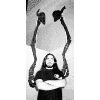CLASSIFICATION
| PARENT CLADES: Animalia: Vertebrata: Tetrapoda: Sauropsida: Archosauromorpha CLADOGRAM:–Mammalia sensu stricto |–Prototheria “before beasts” | `–Monotremata “single holes” (duck-bill platypuses, echidnas (or spiny anteaters)) |?-Allotheria * | |–Haramiyidae * | `–Multituberculata (“multis”) * `–Theriiformes “Theria forms” `–Triconodonta * `–Holotheria |?-Chronoperatidae * `–Kuehnotheria * `–Trechnotheria =Yangotheria |–Spalacotherioidea * `–Symmetrodonta “symmetrical teeth” |–Yinotheria * `–Cladotheria “branch beasts” |–Dryolestoidea * `–Amphitheriida |–Amphitheriidae * `–Zatheria |–Arguimuridae * |–Arguitheriidae * |–Vincelestidae * `–+–Paramura * `–Tribosphenida |–Hypomylos * |–Necrolestidae * `–+–Aegialodontia * `–Theria sensu stricto “beasts” |?-Aethomylos * |?-Anizorhinus * |?-Dakotadens * |?-Falepterus * |?-Kasserinotherium * |?-Paleomolops * |?-Plicatodon * |?-Potamotelses * |?-Russellmys * |?-Tetraprothomo * |?-Tribotherium * |?-Zygiocuspis * |–Endotheriidae * |–Kermackiidae * |–Picopsidae * |–Poppotheriidae * |–Metatheria “middle beasts” (pouched mammals) | |–Holoclemensia * | |–Deltatheridioidea * | `–+?-Monodelphis * | |?-Boreometatheria “boreal beasts” (Asian & North American pouched mammals) * | `–Notometatheria “southern beasts” (Australasian & South American pouched mammals) | |?-Protodidelphidae * | |–Borhyaenoidea =Sparassodonta (Borhyaena, Thylacosmilus, etc.) * | |?-Bonabartheriidae * | |?-Necrolestidae * | |?-Paradectidae * | |?-Simpsonitheria * | `–+–Mayulestes * | `–+–Pucadelphys * | `–+–Andinodelphys * | `–Marsupialia “pouches” | |–Didelphimorpha (American opossums) | |?-Paucituberculata (rat opossums) | `–+–Microbiotheriidae (monitos del monte) | |?-Yingabalanaridae * | `–Australidelphia “Australian possums” ?=Eometatheria (Australasian marsupials) | |–Dasyuromorpha (marsupial mice & rats, quolls, Tasmanian wolves & devils, numbats) | |?-Notoryctidae (marsupial moles) | |?-Tarsipedidae (honey possums) | |?-Yalkaperidontidae * | `–Syndactyla “fused fingers” | |–Peramelomorpha (bandicoots) | `–Diprotodonta “two front teeth” | |?-Palorchestidae * | |?-Thylacoleonidae (marsupial lions) * | |?-Wynyardiidae * | |–Vombatiformes (wombats, koalas) | `–Phalangeriformes (phalangers, kangaroos, etc.) `–Eutheria “true beasts” |–Prokennalestes * `–“Placentalia” “placenta” (placental mammals) |?-Aspanlestes * |?-Bulaklestes * |?-Beleutinus * |?-Daulestes * |?-Eodesmatodon * |?-Eutrochodon * |?-Helioseus * |?-Idiogenomys * |?-Kumsuperus * |?-Neodesmostylus * |?-Obtususdon * |?-Sorlestes * |?-Telacodon * |?-Tingamarra * |?-Veratalpa * |?-Wanotherium * |?-Bibimalagasia * |–Edentata “without teeth” | |?-Pholidota (pangolins or scaly anteaters) | `–+?-Palaeanodonta * | `–Xenarthra (sloths, anteaters, armadillos) `–Epitheria “after beasts” | INCERTAE SEDIS: | Apatotheria * | Leptictida * | Palaeoryctidae * | Taeniodonta * | Tillodonta * |–Asioryctitheria * |–Cimolestidae * |–Pantodonta * |–Pantolesta * |–Zalambdalestidae * |–Insectivora “insect-eaters” =Lipotyphla (shrews, moles, tenrecs, golden moles, hedgehogs, etc.) |–Ferae “fierce ones” | |–Creodonta * | `–Carnivoramorpha “Carnivora forms” | |–Didymictidae * | `–Carnivora “meat-eaters” (dogs, bears, weasels, seals, cats, hyenas, mongooses, etc.) |–Archonta “rulers” | |–“Chiropteromorpha” “Chiroptera forms” | | |–Chiroptera “hand wings” (bats) | | `?-Dermoptera “skin wings” (colugos or flying lemurs) | `–Primatomorpha “Primates forms” | |?-Scandentia (tree shrews) | `–+?-Plesiadapiformes * | `–Primates “primary ones” (apes, humans, lemurs, lorises, monkeys, etc.) |–Anagalida | |–Macroscelidea “large limbs” (elephant shrews) | `–+–Anagaloidea * | `–Glires | |–Duplicidentata | | |–Mimotonida * | | `–Lagomorpha “Lagus (rabbit) forms” (rabbits, hares, pikas) | `–Simplicidentata | |–Eurymylus * | |–Matutinia * | |–Rhombomylus * | `–Rodentomorpha “Rodentia forms” | |–Helomys * | `–Rodentiformes “Rodentia forms” | |–Tribosphenomys * | `–Rodentia (rodents) `–Ungulatamorpha “Ungulata forms” |–Aspanlestes * `–+–Avitotherium * `–+–Alostera * `–+–Zenlestidae * `–+ =Ungulata sensu lato |?-Dinocerata (Uintatherium, etc.) * |–Oxyclaenidae * `–Ungulata “hooves” (hoofed mammals, etc.) |–Arctocyonidae * |–Arctostylopidae * |–Paroxyclaenidae * |–Tricuspiodontidae * |–Tubulidentata “tubular teeth” (aardvarks) |–+–Mioclaenidae * | `–Periptychidae * |–Meridiungulata (extinct South American ungulates) * | |–Didolodontidae * | `–+?-Astrapotheria * | |–Litopterna (Macrauchenia, etc.) * | |?-+?-Pyrotheria | | `–Xenungulata | `–Notoungulata “southern ungulates” | |–Notoprongonia * | |–Toxodontia * | `–Typotheria * |–Mesaxonia =Altungulata ?=Paenungulata ?=Penungulata | |–+–Meniscotheriidae * | | `–+–Phenacodontidae * | | `–+–Embrithopoda (large, double-horned herbivores) * | | `–+?-Hyracoidea (hyraxes) | | `–Perissodactyla “odd number of fingers” (horses, rhinos, tapirs, brontotheriids, chalicotheriids, etc.) | `–+–Loxolophidae * | `–+–Phenacolophidae * | `–Tethytheria “Tethys Sea beasts” | |–Sirenia “sirens (alluring marine creatures of Greek mythology)” (manatees, dugongs, sea cows) | `–+–Desmostylia “linked beam” (hippo-like amphibious ungulates) * | `–Proboscidea “probosces” (elephants, mammoths, etc.) `–Paraxonia |–Triisodontidae * `–+–Artiodactyla “even number of fingers” (pigs, hippos, deer, giraffes, antelope, cattle, goats, sheep, etc.) `–Cete “whales” |–Hapalodectidae * `–+–Mesonychidae * `–Cetacea sensu lato (whales) |–Protocetidae * |?-Remingtonocetidae * `–+–Basilosauridae =Zeuglodontidae (serpent whales) * `–Autoceta =Cetacea sensu stricto (modern whales) | ALTERNATE CLADOGRAM:–Eutheria |?-Erinaceomorpha (hedgehogs) `–+–Atlantogenata | |–Xenarthra | `–Afrotheria “African beasts” | |–Afrosoricida “African shrews” (tenrecs, golden moles, etc.) | |–Macroscelidea | `–Pseudungulata | |–Tubulidentata | `–Paenungulata =Uranotheria | |–Hyracoidea | `–Tethytheria `–+–Glires |–Euarchonta | |?-Dermoptera | `–Primatomorpha `–Laurasiatheria “Laurasian beasts” |–Eulipotyphla (shrews & moles) `–Scrotifera |–Chiroptera `–Fereuungulata |–Zooamata “animal friends” | |–Carnivora | |–Perissodactyla | `–Pholidota `–Artiodactyla =Cetartiodactyla ?=Paraxonia |–Tylopoda (camels, llamas, etc.) `–+–Suoidea (pigs, peccaries) `–+–Ruminantia (deer, giraffes, antelope, cattle, goats, sheep, etc.) `–Whippomorpha “whale-hippo forms” |–Hippopotamoidea (hippopotami, etc.) `–Cetacea sensu lato |
see also: Genus Index, Classification
ESSAY
| Mammals originated around the same time as the dinosaurs, but remained in their shadow throughout the Mesozoic. After the K/T extinction, they diversified to fit the niches that the dinosaurs left empty, as well as many other niches. Go us! Dinosaurs may be cool, but who’s on top of the food chain now, eh? I have to go eat some chicken. |
IMAGES
Click on thumbnail to see full image.
| BRENDAN SMITH Photography |

the mighty arms of Deinocheirus mirificus with 5′ 11½” human (site’s author) for scale |